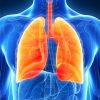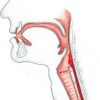Respiratory Disease
Quinsy Treatment during Pregnancy
During incubation of the child immunity of future mother decreases as a result chronic diseases can become aggravated, but most often “gate” of infection occurrence is considered to be airways. It is good if the woman got off with a slight cold but when temperature sharply increases, there is a sore throat, it is impossible to transfer such disease on the go, the correct approach
My Canadian Pharmacy: Barking Cough
Existence of pathological process of the top airways namely throat or trachea is the reason of barking cough. The severe barking cough most often can be observed at children of younger age (till five years). In most cases it is a symptom of an infectious disease exactly whooping cough. The causative agent of whooping cough is the microbe of Bordetella pertussis which is transferred in
Chronic Bronchitis: Definition, Symptoms and Treatment
Chronic bronchitis is an inflammatory disease of bronchial tubes which is followed by phlegm allocation and constant cough within 2 and more years. Pulmonologists suggest dividing chronic bronchitis which symptoms meet at 3-8% of adult population, into 2 forms: primary; secondary. At primary bronchitis in the patient, the diffusion disorder of bronchial tree which isn’t connected with other inflammatory processes proceeding in man’s body is
What is Bronchiectasis?
Bronchiectasis is a disease which is defined by the localized irreversible expansion of part of the so-called bronchial tree caused by the destruction of muscles and fabrics elasticity. Bronchiectasis is classified as a chronic obstructive pulmonary disease, also as well as emphysema, bronchitis, asthma and cystic fibrosis. Bronchiectasis of lungs can result from various infectious diseases, including heavy and recurrent pneumonia, tuberculosis and cystic fibrosis.
Why Does Weight Loss Improve the Respiratory Insufficiency of Obesity?
Sugerman et al (Chest 1986; 90:89[July]) reported the beneficial effect of weight loss in a group of patients with respiratory insufficiency of obesity. This includes patients with sleep apnea syndrome (daytime hypersomnolence and obstructive apneas during sleep), obesity-hypoventilation syndrome (daytime hypercarbia and hypoxemia) and both syndromes. Since only 14.4 percent of morbidly obese patients undergoing surgery for weight reduction in the study by Sugerman et








